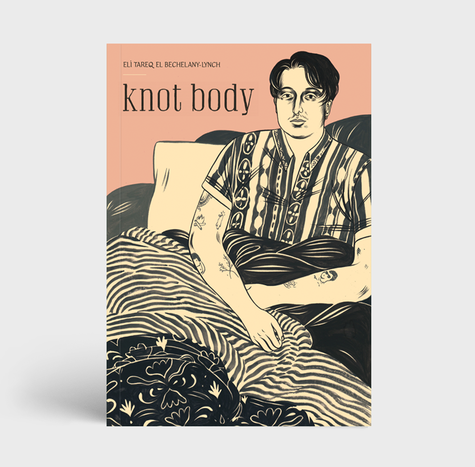Eli Tareq El Bechelany-Lynch's knot bodyReviewed by Erica McKeen
|
|
Perhaps few authors would describe writing their books out of desperation, but perhaps more should: if writing is an attempt to voice new ideas, to frame words around the as-yet unknown, to communicate that which has resisted or been barred from the realms of the spoken and cliché, then perhaps the true, volcanic breaking of this silence and pulling out of new words is always somewhat rebellious, somewhat experimental, and stems from a place of need, of last-ditch impulse—of desperation.
“I am desperate for a larger vocabulary to talk about my pain,” Eli Tareq El Bechelany-Lynch writes in their book, knot body (Metatron Press, 2020). This desperation—a desperation for a new or better vocabulary—haunts the book, sidling up behind every word El Bechelany-Lynch selects to communicate their suffering. knot body, therefore, functions as a refutation of silence. It acknowledges that invisible, internal illness can only be made visible through words and story. It is a speaking back against the unspeakable infinities of chronic pain. And it is cleverly (not to mention poetically) done. The format of the book is its first alluring aspect. Calling attention to the various available structures of creative writing and using each of them in turn, knot body not only expresses in its form the unconventionality of its narrative, but also suggests that no one genre can encapsulate the experience recorded in its pages. El Bechelany-Lynch’s blend of epistolary memoir and poetic musing is not a one-size-fits-all account. Chronic pain, fibromyalgia chronic pain, queer fibromyalgia chronic pain, Arab queer fibromyalgia chronic pain is not the experience of many Canadians, so it cannot be expressed through normative literary structures. This lyrical fusion of love letter, personal essay, and experimental poetry succeeds in capturing El Bechelany-Lynch’s particular intersectional experience in a way that more traditional literary forms could not. This is not to say that knot body is so unique as to be unrelatable—El Bechelany-Lynch’s story, with its pain and joys, its frustrations and triumphs, speaks for anyone who does not fit neatly into a system, and especially a medical system, that provides only one overly simplistic and reductive mould. Throughout the book, El Bechelany-Lynch struggles with this mould, attempting to produce a suitable narrative that will allow them to fit inside it and receive vindication from medical professionals. Without affirmation—without professional diagnosis—their illness can, as El Bechelany-Lynch writes, feel removed from reality, disintegrating into make-believe: |


